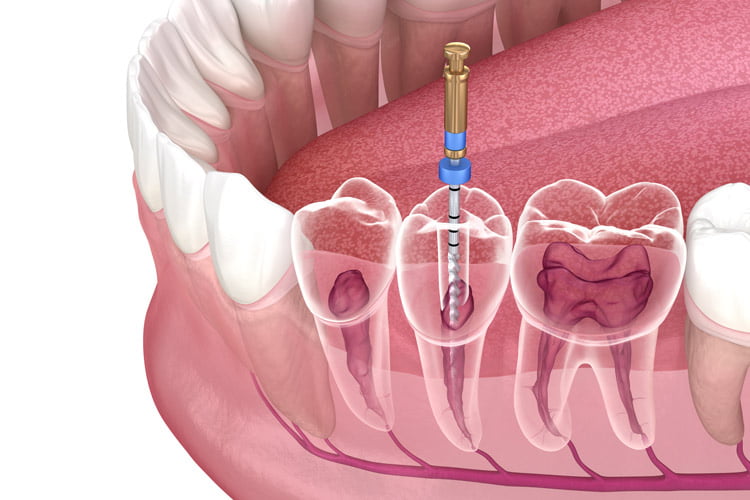Root Canals
Natural teeth are meant to last a lifetime.
When disease or infection strikes, a root canal may save your tooth.
“You need a root canal” may be the phrase most dreaded by dental patients. Despite the scary reputation, having a root canal done is not too bad. It is often a welcomed alternative to losing a tooth. Having root canal therapy is often the best way to save an infected tooth or a tooth that has been traumatized. If one of your teeth needs a root canal, your Dental Health Associates of Madison dentist will explain why and make sure that you are completely comfortable before, during and after your procedure.

Root Canal Treatment
Diagnosis
Inside each one of your teeth is the pulp, which provides important nutrients and nerves to the tooth. Once the pulp has been irreversibly infected or injured, bacteria that are naturally present in your body flock to the area to feed off the dead tissue in the root. Removing the pulp will prevent chronic pain or infection that could lead to the loss of your tooth.
Pulp Removal & Replacement
During your root canal, your Dental Health Associates of Madison dentist will remove the pulp, clean the interior of your tooth, and replace the pulp with a rubber compound called gutta percha. This can prevent bacteria from entering the tooth and causing infection. The tooth will be capped with a temporary filling which will need to be replaced after the completion of your root canal.
Crown Placement
After your root canal is complete, your tooth will no longer have the pulp bringing it nutrients, and it may become weak or even change color. Your Dental Health Associates of Madison dentist will place a crown over your tooth to increase its durability and function and restore it to its natural color.
Anatomy of a Root Canal
Infected tooth
Opening made
in tooth
Infected tissue removed;
canals cleaned
Canals filled with
permanent material
(gutta percha)
Opening sealed with filling.
In some cases, a post is inserted for extra support
New crown cemented
onto rebuilt tooth
Root Canals FAQs
The only alternative for a diseased or infected tooth that needs a root canal is to extract the tooth. The loss of the tooth can lead to a decrease in function and possible positional changes for the remaining teeth.
A root canal treatment usually involves one or two visits. During treatment your Dental Health Associates dentist or endodontist (a dentist who specializes in problems of the tooth pulp) will remove the diseased pulp. They will then clean, shape, and fill the canals of your tooth. Depending on which tooth is being treated and how many roots the tooth has, a typical appointment could last one to two hours.
A root canal treatment is a routine procedure much like fillings and crowns. Local anesthetic is used to numb the nerve of the tooth. You do not need to be put to sleep for the procedure, and you will be able to drive before and after your appointment. Your Dental Health Associates of Madison dentist will make sure that you are comfortable before, during and after the procedure.
Insurance coverage varies greatly for each individual policy. To find out what percentage may be covered by your insurance plan, refer to the information provided to you when you enrolled, or call the 1-800 number on the back of your card to ask a representative. If you need help obtaining this information, a Dental Health Associates front desk staff member would be happy to help you. If you are a DHA patient, our financial coordinators will help you obtain an estimate of coverage if requested.
Patient Information
We encourage new patients to fill out a new patient form online prior to your first appointment. Be sure to select the appropriate location for your new patient forms, as once you complete them, they are sent electronically to the office you’ve chosen.
Insurance
Medical and dental insurance can be confusing. Our staff has experience with your questions and can help you get the most from your insurance.
No insurance? Apply today.